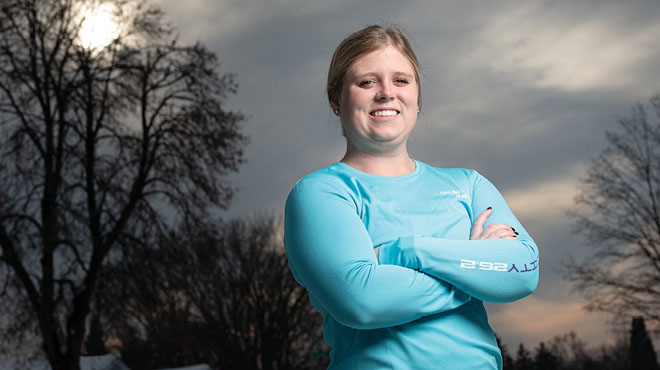Recent Posts
-

-
 Patient StoriesA lifesaver saved: An EMS veteran’s journey from rescue to recoveryNovember 14, 2025
Patient StoriesA lifesaver saved: An EMS veteran’s journey from rescue to recoveryNovember 14, 2025 -

Weight loss, knee surgery have man living active lifestyle

Some people live to eat. Others eat to live. Mike LeDuc was somewhere in between.
“I wouldn’t say that I loved to eat, but I used to like to eat a lot,” says Mike, a 65-year-old Chippewa Falls, Wisconsin, resident. “I never met a food I didn’t like.”
Now, he has changed his ways. With the help of the weight management program at Mayo Clinic Health System, he lost 100 pounds in six months.
WORKING TO KEEP WEIGHT OFF
Although his initial weight loss phase is complete, Mike, a retired police sergeant, continues to remain active in the program’s second phase to ensure that the pounds stay off.
Rhonda Jenson, a health educator in Weight Management Services at Mayo Clinic Health System in Eau Claire, says Mike is “doing phenomenal” in the program and attending class religiously, keeping meticulous records of calories going in and out, and doing whatever it takes to be successful. This is no small undertaking, she says, noting that Phase 2 often is more difficult than Phase 1.
“Many people have lost weight,” Rhonda says. “The real trick is learning to keep it off, and Phase 2 of our program is really designed to support the patients. It gives them some structure in terms of how to eat and help them take accountability for their choices.”
Mike initially joined the program after learning he was not eligible for knee replacement surgery due to elevated complication risks. Mike’s body mass index, or BMI, was 44.5 at the time. Tim O’Connor, M.D., Mike’s orthopedic surgeon, required that number be under 40 to reduce his risk of complication following surgery.
“That’s probably what triggered it more than anything else,” Mike recalls. “He said, ‘I won’t operate until you lose some weight,’ and I said, ‘Well, I really want to have a new knee.’”
Losing weight through the program was easy, Mike recalls, especially with the meal replacement shakes guiding his mealtime decisions. In six months he went from 302 pounds on his 5-foot-9-inch frame to a much healthier 200. He dropped another 10 pounds in the maintenance phase.
Mike says he appreciates the program’s educational, yet supportive, structure and plans to continue with it for the foreseeable future. He regards it as an investment in his future.
“The staff who teach this program are extremely good at motivating you in a gentle but persuasive way,” he says. “And they’re also good at not placing any blame or making you feel bad about what you were or did and how you got there in the first place. They’re not judgmental at all.”
ACTIVE AGAIN
Mike joined the program in March 2016 and underwent a successful knee surgery in April 2017. He says it has been a long time since he was in such good shape. Mike rides his stationary bike and walks his dogs every day, strength trains, does situps and pushups, and remains active around the house. Living an active lifestyle, coupled with the weekly weight management classes he attends, helps him maintain his healthy weight.
“It’s a good program. I think they do a wonderful job,” says Mike, who recommends the program to others without hesitation. “It’s easy to succeed in it as long as you do what they say.”
Rhonda says she and her fellow health educators are happy to work with people at any place in their weight loss journey — whether they’re looking to shed 20 to 200 pounds — and help them remain accountable and on task.
“They know what to do. Our goal is to help them do what they know,” she says, adding that an estimated 53 percent of Americans were considered overweight or obese when she entered the field 30 years ago. Today, 70 percent are. “The world hasn’t gotten easier for anybody trying to manage their weight,” Rhonda says. “They really need the structure.”



